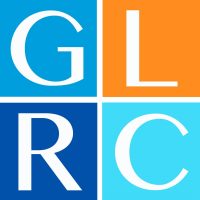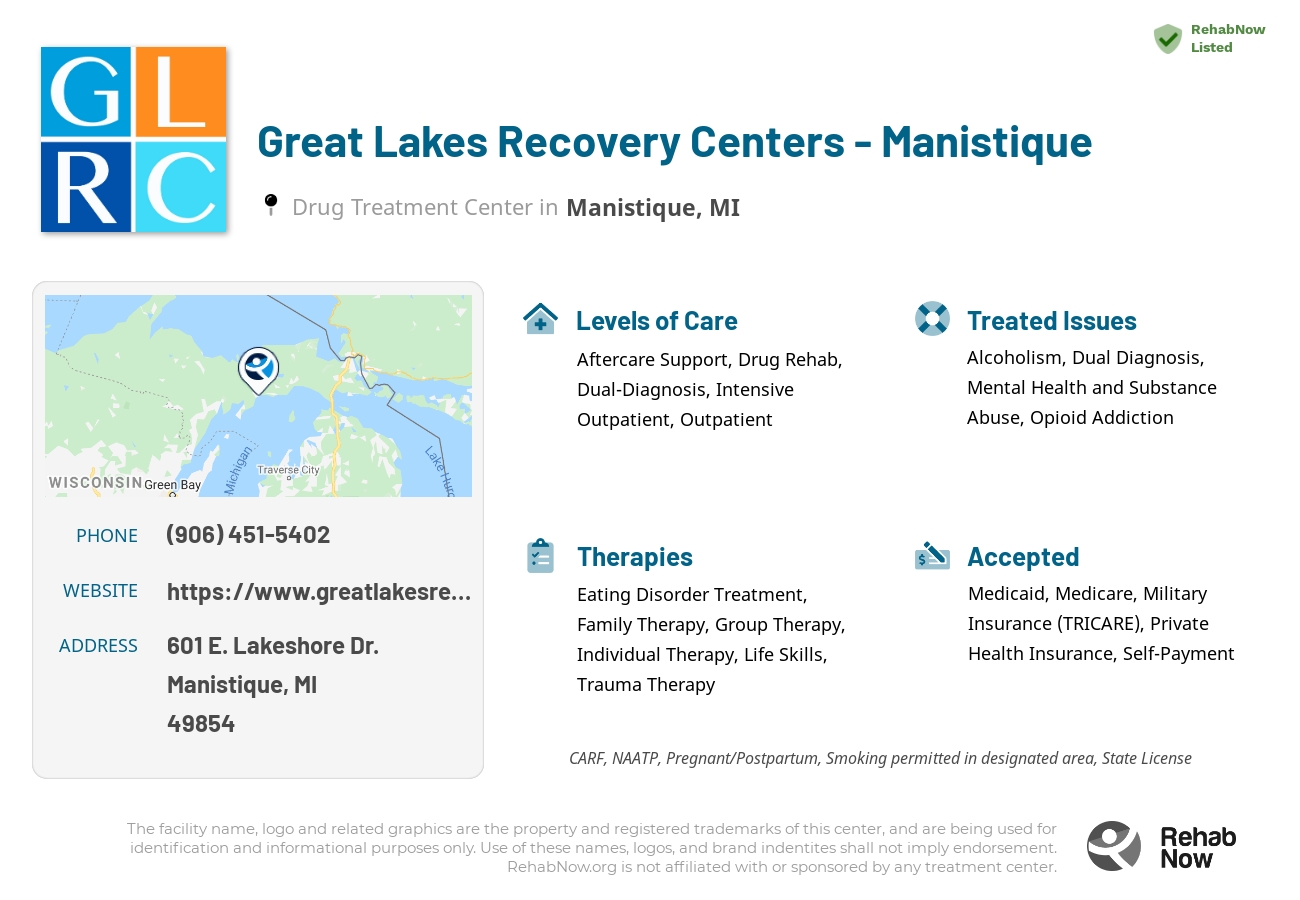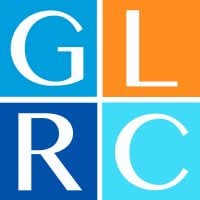Great Lakes Recovery Centers - Manistique
Drug Rehab Center in Manistique, Michigan
Great Lakes Recovery Centers - Manistique is a licensed and accredited addiction treatment center in Michigan that provides evidence-based and culturally-sensitive care, including individual and group counseling, medication-assisted treatment, adjunctive therapies, educational and vocational services, and family programs, as well as case management services.
About
Great Lakes Recovery Centers - Manistique is a comprehensive addiction and substance abuse treatment center in Manistique, Michigan. Their multidisciplinary team provides a wide range of services, from individual and group counseling to medication-assisted treatment and detoxification. The center has a strong commitment to providing evidence-based and culturally-sensitive care for individuals who have a variety of addiction-related needs.
Great Lakes Recovery Centers - Manistique offers a variety of evidence-based therapies and modalities that are designed to treat both substance use disorders as well as co-occurring mental health and physical health issues. They incorporate adjunctive therapies such as motivational interviewing, behavioral health interventions, mindfulness, and yoga into their treatment plans. Further, Great Lakes Recovery Centers - Manistique provides educational and vocational services, as well as substance use relapse prevention curriculums and therapeutic activities.
Great Lakes Recovery Centers - Manistique is licensed by the Michigan Department of Licensing and Regulatory Affairs, is accredited by the Commission on Accreditation of Rehabilitation Facilities, and has been recognized with a “Best Practices Award” for their individualized addiction treatment plans. They also offer an extensive family program to help family members of individuals struggling with addiction and substance use disorder. Great Lakes Recovery Centers - Manistique provides intensive case management services to clients, which include assistance with housing and transportation, access to community resources, and referrals to outside services.
Genders
Ages
Modality
Additional
Conditions and Issues Treated
Within the past decade, opioid addiction has become a nationwide epidemic. The United States hosts one of the world’s highest rates of opioid use or abuse and has one of the highest rates of opioid-related deaths. In the United States, opioid drugs are classified as Schedule II-IV controlled substances due to their highly addictive properties and potential for abuse. These include morphine, opium, heroin, oxycodone, hydrocodone, methadone, and fentanyl. Physicians usually prescribe opioids to help control pain.
Over time, opioid users develop a tolerance for the drugs, which makes it difficult, if not impossible, to function without them. In turn, opioid users often resort to illicit means of obtaining the drugs. These means can include drug dealers, friends, and family members who do not have legitimate prescriptions for the drugs. Opioid addiction can quickly lead to heroin use, especially those seeking more intense highs than prescription opioids offer. Due to the high risk of overdose, heroin users are at a much higher risk for illness and death.
A person who struggles with addiction and a mental health condition suffers from a dual diagnosis. This means that they have two issues that must be treated. The specific mental health issues that the patient at Great Lakes Recovery Centers - Manistique might have include but are not limited to:
- Depression
- Bipolar Disorder
- Anxiety
- PTSD (Post Traumatic Stress Disorder)
The specific addiction issues that the patient might have include but are not limited to:
- Alcoholism
- Drug Addiction (i.e., Cocaine, Meth, and other stimulants, Marijuana, and Ecstasy)
The combination of the two illnesses can be tough to treat. Taking care of one or the other is tough, and taking care of both cannot be done alone. A patient who receives dual diagnosis treatment will be given the best chance at becoming sober.
Levels of Care Offered
This center offers a variety of custom treatment tailored to individual recovery. Currently available are Aftercare Support, Drug Rehab, Dual-Diagnosis, Intensive Outpatient, Outpatient, with additional therapies available as listed below.
Intensive Outpatient Programs are similar to partial hospitalization, but they don’t require the patient to go home each night.
This means that while they have to attend meetings and receive other types of help at the facility, addicts are allowed to keep their jobs or continue with school without having to miss their classes or work opportunities. This is a great option for those who can’t take time away from their jobs or schedules to attend a treatment program.
During this type of program, the addict will be required to meet with counselors and other types of professionals throughout the day. This will help them stay on track and prevent them from relapsing after they leave the facility.
An outpatient treatment program is set up to help with alcohol or drug addiction or a co-occurring disorder. The treatment must attend the treatment facility for their therapy and other programs but return home each night. The frequency of mandatory attendance decreases after much of the treatment program is complete. The treatment programs are monitored by the treatment facility and case managers who work for a judge or judge’s office. A treatment program may be performed out of a treatment facility, treatment clinic, or treatment center.
The benefits of outpatient treatment programs are many. One of the most beneficial treatment programs is that it allows treatment for clients who cannot afford or may not be able to attend treatment at a treatment facility, treatment center, or treatment clinic full-time. Another benefit of treatment programs is that they reduce crime rates because treatment allows people to treat their addiction.
Recovering drug addicts need aftercare support when they leave treatment. The support can include guidance through 12-step programs, outpatient rehabilitation programs, and support groups. Aftercare supports the individual in their desire to maintain sobriety by reducing relapse risk with positive choices.
The success of drug treatment does not end when the addict leaves the rehabilitation center. There is no such thing as a “one and done” type of rehabilitation process. Recovery is a lifelong journey that begins with treatment and continues by the addict committing to outside support groups or drug rehab programs.
When choosing a program, it is crucial to choose one that will provide long-term aftercare support. This ensures that you have the tools you need to sustain your recovery.
Therapies & Programs
Individualized Treatment is essential because it gives addicts the ability to participate in a program that meets their unique needs. An addict should work with professionals who understand what they’re going through, especially if the addict is actively using. Finding the right treatment program for an addict is difficult, but it’s even harder without communicating with those who have experience treating your specific situation.
The therapies typically involve all family members, potentially including siblings, children, and parents who play a role in their daily lives. These sessions can be essential because they address past issues that may have affected an addict or alcoholic’s recovery process. They provide support during this time when it is needed most!
A family therapy session, often called a family meeting or intervention, is a necessary process that helps loved ones of addicts see their situation in a new light. It’s also one of the most challenging things families will ever have to do when they’re facing a loved one battling addiction or alcoholism.
Group therapy sessions provide recovering addicts with a chance to cope with everyday situations that many face. Group therapy sessions are held in rehab facilities, clinics, churches or community centers that offer drug addiction treatment.
People who attend these groups are encouraged to voice their feelings and support other addicts in recovery. This helps group members strengthen their own recovery program while cheering on others who are struggling with sobriety.
Trauma therapy allows them to work through past trauma to have peace of mind and begin down the road of sobriety. The therapist will work with the individual to help them understand their past and present relationships. Patients may often believe that something is inherently wrong with them or they are unworthy of love. The therapist aims to correct these negative feelings and behaviors by helping the person realize that their actions do not reflect who they truly are.
Life skills training is beneficial for addicts in recovery because it helps them learn how to take care of themselves and improve their quality of life, which can promote feelings of purpose and motivation.
This works by teaching individuals life-enhancing skills that support positive living, including:
- Healthy lifestyle habits
- Skills to effectively manage stress
- Effective communication skills to help them get their needs met without turning to drugs or alcohol
- Money management and budgeting skills so they can continue to take care of themselves after treatment ends.
Payment Options Accepted
For specific insurance or payment methods please contact us.
Is your insurance accepted?
Ask an expert, call (888) 674-0062
Great Lakes Recovery Centers Associated Centers
Discover treatment facilities under the same provider.
- Great Lakes Recovery Centers - Adult Residential Services in Marquette, MI
- Great Lakes Recovery Centers - Mountain in Iron Mountain, MI
- Great Lakes Recovery Centers - Men's New Hope House in Sault Sainte Marie, MI
- Great Lakes Recovery Centers - Women's New Hope House in Sault Sainte Marie, MI
- Great Lakes Recovery Centers - Wright street in Marquette, MI
Learn More About Great Lakes Recovery Centers Centers
Additional Details
Specifics, location, and helpful extra information.
Manistique, Michigan 49854 Phone Number(906) 451-5402 Meta DetailsUpdated November 25, 2023
Staff Verified
Patient Reviews
There are no reviews yet. Be the first one to write one.
Manistique, Michigan Addiction Information
Michigan has the second-highest rate of drug and alcohol abuse in the nation. Heroin is linked to more than 50% of the state's hepatitis C cases. Marijuana is the drug most often associated with crimes in Michigan, followed by methamphetamines. Opioids alone are responsible for almost 20% of all drug overdose deaths in Michigan.
Manistique, Michigan, has a severe drug addiction problem. According to the National Institute on Drug Abuse, in 2016, about 8.5% of Manistique residents ages 12 and older reported using illicit drugs within the past month. From 2002 to 2015, overdose deaths increased by 675%. There are several drug treatment options available in Manistique, Michigan. The most common are residential treatment, outpatient, and 12-step programs.
Treatment in Nearby Cities
- Canton, MI (286.5 mi.)
- Walled Lake, MI (272.5 mi.)
- Novi, MI (276.1 mi.)
- Ishpeming, MI (78.0 mi.)
- Commerce Township, MI (270.1 mi.)
Centers near Great Lakes Recovery Centers - Manistique
The facility name, logo and brand are the property and registered trademarks of Great Lakes Recovery Centers - Manistique, and are being used for identification and informational purposes only. Use of these names, logos and brands shall not imply endorsement. RehabNow.org is not affiliated with or sponsored by Great Lakes Recovery Centers - Manistique.




